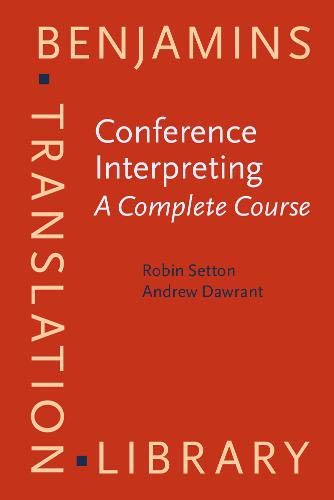The following passage from Robin Setton and Andrew Dawrant’s excellent Conference Interpreting – a complete course is reproduced without the publisher’s permission.
Simultaneous interpreting timing and tactical choices (1)
We have seen that timing and optimal ‘entry points’ in SI depend on three main factors:
1. A viable production base: Have I got enough sense to start saying something? Since sense comes from both incoming words and context, this base can consist of
a. EITHER, a ‘unit of sense’ (Lederer 1990:115 ff.) that fully expreses or completes an idea, or – more typically, at the beginning of sentences – a self-contained unit that can be translated with little or no risk, eg. ‘Furthermore, …’, ‘Next point…’, ‘A better example…’, as well as most adjuncts specifying time, place or circumstance (‘Since our last meeting…’);
b. OR, enough context and general sense of the direction of the speech to stall by padding, guessing or anticipating even without much evidence from the actual words heard so far. For example, to avoid a long and uncomfortable pause when a speaker starts off hesitant and confused, and syntax or word meaning is stilll unclear: ‘Erm, I think we can run, er… well, at least, just, at this point, …’, the interpreter can say ‘ Ensuite,… enfin je vous propose la chose suivante…’ . (‘Next let me suggest this…’)
2. Memory: Do I risk forgetting if I try to hold it in memory and delay expresing it? The answer depends on the density and newness of the information, especially for the interpreter, and on certain attested facts about short-term memory, such as (i) primacy and recency effects: the first and last items of a list may be remembered first, the others later; and (ii) the ‘solubility’ in memory of different items; numbers and unfamiliar names cannot always be associated with the surrounding meaning, so memory for them is very short. Finally expressing the content rehearses the memory of it and ‘renews’ it in the target language.
3. TL Availability: Which part of the input do I have TL words most ready to express, lexcially (a viable equivalent) and/or syntactically: can I continue or finish the current sentence, start a new one, produce a meaningful link? In either case, the first words uttered can either be definitive (if you find the perfect phrase…) or, if meaning is still vague, a placeholder, adjustable later (8.4.3 above)
